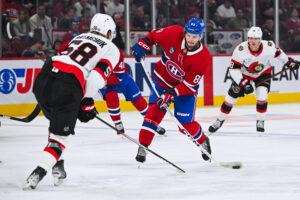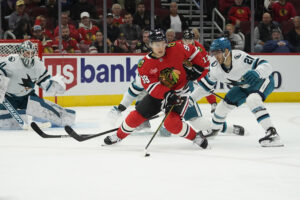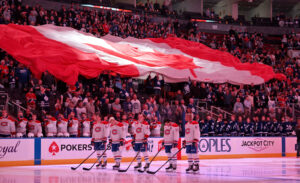A new cultural era is coming to NHL hockey. Last month, at the NHL Board of Governor’s Meetings, Commissioner Gary Bettman announced a proposed “NHL Code of Conduct”. If implemented in its current form, it could fundamentally alter some of the game’s traditions and existing codes. The new proposal would have substantial implications for players, coaches, and the organizations that they represent.
NHL Code of Conduct: A New Cultural Era in Hockey
Hockey’s Codes
Hockey’s culture is built around codes. These codes are informal. Enforcement often occurs within teams or among players. Certain ones, such as fighting to discourage dirty hits and protect overall player safety, can seem counter-intuitive. Yet many codes are regarded as a positive, necessary, and unifying force in the game.
One goal of these codes is to teach players the importance of building a team bond. The promotion of individual commitment to a common cause is an essential component of team success at the NHL level. At their most basic level, informal codes in hockey teach athletes to subsume their individual needs for the good of the organization. The interests of the team trump all other considerations. The priority is the collective.
Until recently, because of this mentality, what happened in the locker room usually stayed in the room. Organizations emphasized players protecting the team by shielding their individual concerns from the public. Players often concealed injuries and internal conflicts from the media, for fear they would be used to divide the team, make them a target for opposing players, or create external drama.
Current Culture Shift
Times are changing. Following the recent dismissals of NHL coaches such as Mike Babcock and Bill Peters, from the Toronto Maple Leafs and Calgary Flames, questions have arisen regarding the use of potentially abusive motivational tactics. Unlike the old days, where such conduct by coaches was often kept private, their behavior has become the subject of considerable public criticism by players.
In his statement following the NHL Board of Governor’s Meetings in December, Gary Bettman highlighted diversity and inclusion as “foundational principles of the NHL”, and stated that the NHL “will not tolerate abusive behavior of any kind.” In making these statements, Commissioner Bettman emphasized the importance of the NHL taking the opportunity to quickly evolve.
Bettman’s position reflects the fact that hockey culture is shifting under intense public scrutiny. The old focus on protecting the team whatever the individual cost, has given way to increased emphasis on protecting individual hockey players.
NHL’s Proposed Code of Conduct
To that end, the NHL has proposed several measures. They include:
- A zero-tolerance policy for failure to notify the NHL of any incident involving “clearly inappropriate, unlawful or demonstrably abusive behavior.”
- Creation of mandatory annual counseling, education, and training programs for coaches and management. The program would promote diversity, inclusion, and respect in the workplace.
- Establishing a confidential hotline to allow anonymous and timely reporting of potential incidents of inappropriate behavior.
- Disciplinary measures that are severe enough both to remedy the situation and deter future conduct.
Implications for Players
This policy could have several positive effects on hockey players. It should ultimately produce a more supportive and respectful work environment. Coaches and management will have the opportunity to gain a better understanding of individual contexts, and the role those contexts play in influencing a player’s success. Because of this, the policy could also help remove barriers faced by certain players to NHL entry. Ideally, players will be more consistently judged on performance rather than background.
The policy also represents a shift in the power dynamic from coaches to players. Players will now have increased influence over coaching tactics and management behavior. It will be interesting to see how this affects management’s capacity to hold players accountable, and the type of motivational tactics employed by coaches.
Implications for Management
Unlike in the past, coaches will have to be more careful when dealing with players. The league’s policy is likely to shift many coaches away from more extreme motivational tactics that are dependent on negative reinforcement. The days of the “Iron Mike” Keenan coaching style appear to be numbered.
The potential power shift from coaches to players will also likely give rise to new labor issues. One key issue will be what constitutes inappropriate or abusive behavior. While some instances can clearly cross that line, others will be more difficult to assess. For example, does yelling at a player now qualify as verbal harassment?
Initially, such grey areas will have to be ironed out through trial and error. Many issues will come under considerable debate. Discipline will be heavily dependent on context.
This policy could also leave coaches and players vulnerable in the court of public opinion. It is crucial that allegations of abusive behavior remain confidential until the conclusion of investigations. Similarly, the identity of players who act as whistleblowers must be protected from the teams themselves. In practice, this may prove difficult to achieve. The NHL will have to take specific steps to protect the integrity of the process.
Final Thought
In recent years, the professional sports landscape in North America has begun to reflect social changes. Until recently, the National Hockey League has largely managed to skate by without making major adjustments to its codes and practices. Hockey’s emphasis on preserving its traditions has largely continued, in contrast to other sports.
Some of its traditions are now under scrutiny. This is an important moment for the league. Gary Bettman’s proposed Code of Conduct represents a unique leadership opportunity for the NHL in the sports world.
However, it does not come without issues. Any disciplinary process for inappropriate behavior must protect all parties from premature judgment or organizational reprisals. Due process will be important when conducting investigations. Outcomes under this policy will have dramatic impacts on lives and careers. If these concerns can be addressed, this initiative represents an important step in the evolution of hockey.
Embed from Getty Images






